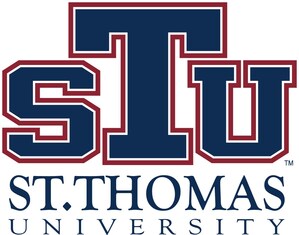
MIAMI, Jan. 26, 2012 /PRNewswire-USNewswire/ -- St. Thomas University School of Law's LL.M./ J.S.D. Program in Intercultural Human Rights, through its Human Trafficking Academy and the Intercultural Human Rights Law Review, hosts its annual symposium titled Justice at the Door: Ending Domestic Servitude, on human trafficking and domestic servitude Friday, January 27. Taking place in the Moot Court Room of the Law School, the symposium starts at 9 AM and ends at 5 PM with a cocktail reception, sponsored by the School's International Law Society student organization.
(Logo: http://photos.prnewswire.com/prnh/20100709/STULOGO )
The free event, made possible by scholarly contributions, will discuss domestic servitude as the second largest type of forced labor in the United States. Intended for attorneys, prosecutors, judges, social service providers, mental health services providers, healthcare workers, religious institutions, and the community at large, the program will include discussion of historical perspectives on domestic servitude, the intersection of protections of labor law vis-a-vis domestic worker rights, and the new International Labour Organization Convention Concerning Decent Work for Domestic Workers. To register for the symposium or to get more information, please go to www.stu.edu/justiceathedoor.
This weekend, the Graduate Program in Intercultural Human Rights and the International Moot Court Board of St. Thomas University School of Law host the Seventh Susan J. Ferrell Intercultural Human Rights Moot Court Competition - January 28 and 29. Teams from all over the world will compete. Some come from as far away as the American University of Sharjah-United Arab Emirates. The objective of the competition is to promote awareness of human rights law. This year's problem revolves around the trafficking in human beings, domestic servitude, and the forcible removal of organs as well as the brutal suppression of a democratic uprising by a dictatorial regime. The law school community is invited to witness what should prove to be an exciting competition. Florida Bar has approved 9 CLE credits for this event.
In a most comprehensive approach, this year's focus is a discussion on domestic servitude as a special category of labor trafficking: the plight of domestic workers such as maids, housekeepers, child-care givers, those caring for the elderly, the ill, and the infirm. It constitutes the second highest incidence of forced labor in our country.
Every year, U.S. citizens and foreign nationals living in the U.S. bring thousands of domestic workers into the country. Many of them suffer abuse, ending up essentially held in bondage. Frequently these are young women who have been promised a decent job and pay, an education, a dream to come true in America, but rarely get what they bargained for. Through contributions from scholars and practitioners, the School will discuss historical perspectives on domestic servitude, the intersection of protections of labor law vis-a-vis domestic workers, domestic and international legal frameworks regarding human trafficking, potential consequences of waiving diplomatic immunity for cases of human trafficking and many more issues.
About 170 people have already registered for this symposium, many of them attending it on line, from their work stations in as far as Mexico and from several U.S. locations: Alabama, Arizona, Arkansas, California, Colorado, Georgia, Louisiana, Maryland, Massachusetts, Missouri, Minnesota, New York, Texas, Virginia, Washington D.C. The registered participants represent and impressive range of professions, indicating the extraordinary reach of St. Thomas University's Human Trafficking Academy and success in accomplishing its mission of building partnerships to combat the most egregious affront to human dignity: modern-day slavery. Distinguished speakers also come from a variety of places and professions. Some are survivors of domestic servitude and their attorneys, others are scholars and renowned experts and practitioners who go after perpetrators, service providers and human rights advocates, governmental and non-governmental representatives, religious institutions, students and faculty.
For information on other St. Thomas University programs and Schools, please visit www.stu.edu.
SOURCE St. Thomas University





Share this article